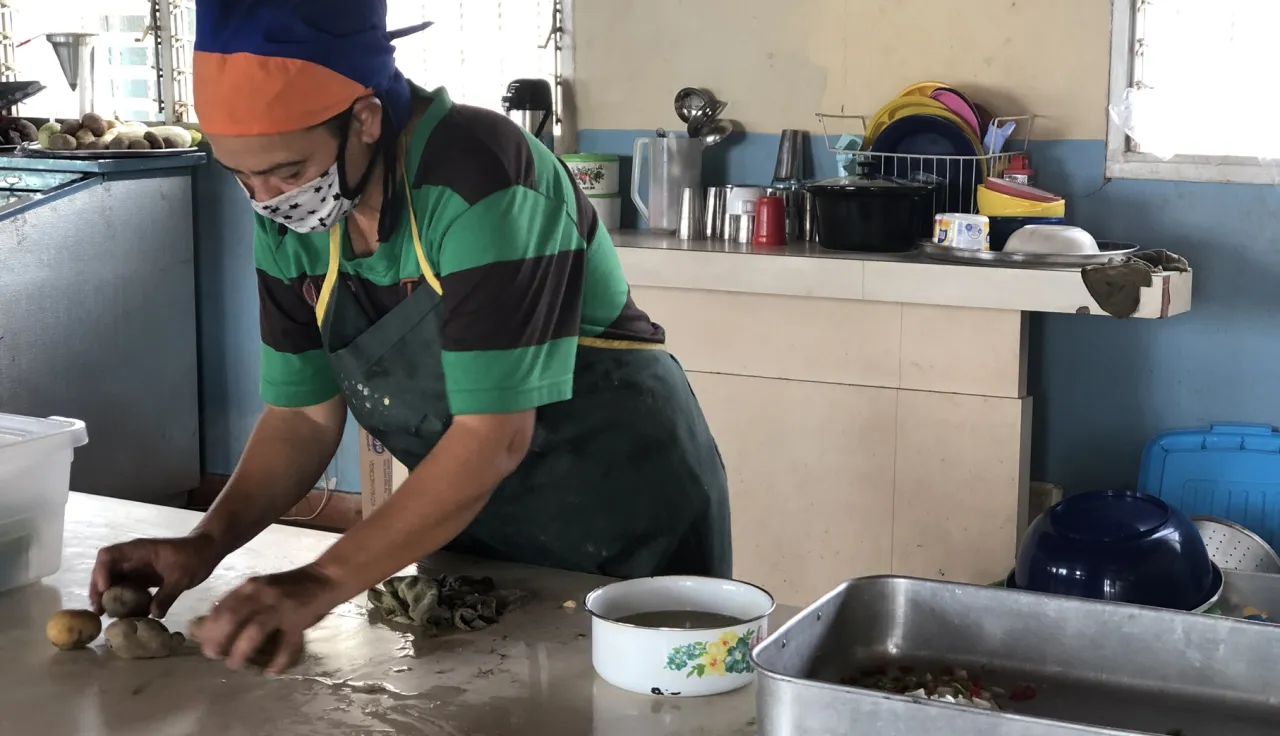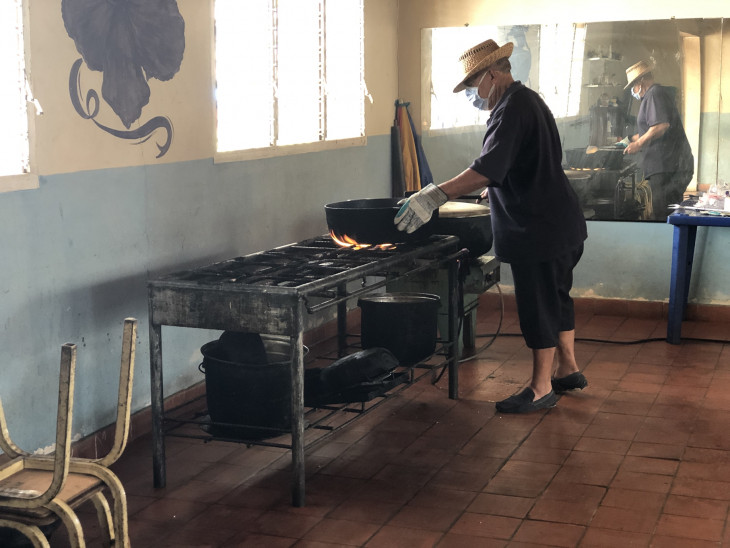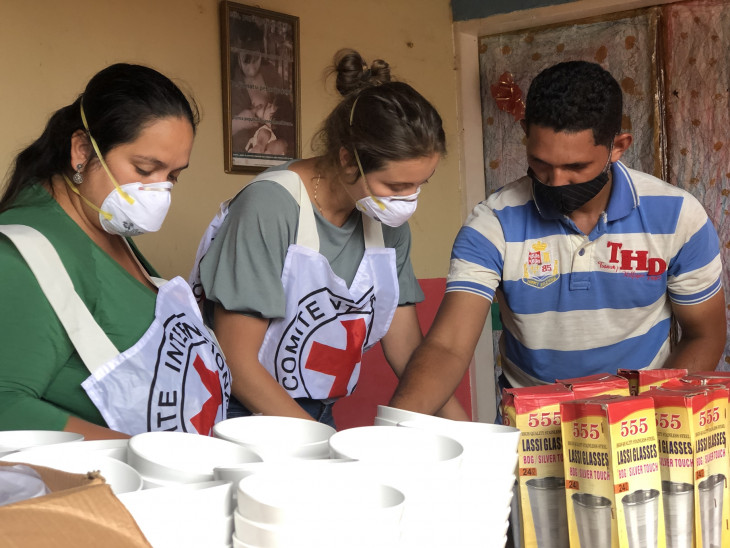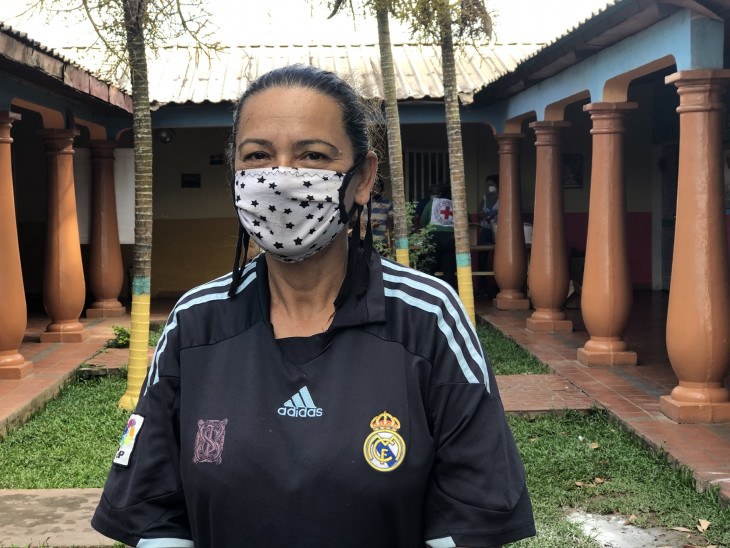Venezuela: Nourishing the hope of returnees during COVID-19

Neither Luis, Jorge, or Lisseth were born in the city of Santa Elena de Uairén, in the state of Bolívar, but due to different life circumstances, they were all in Santa Elena when the COVID-19 pandemic caught them by surprise. They had no idea of the impending global scale of the virus and had no alternative but to stay.
Santa Elena is located in the southeast of Venezuela, only 20 km from the border with Brazil. It is surrounded by a savannah and plateaus known as tepuis, which prior to the COVID-19 pandemic attracted tourists from all over the world. The city has a population of 50,000 inhabitants composed of a rich mix of cultures with the presence of native people and immigrants attracted by the mining and tourism industries.
The proximity to the border has made Santa Elena de Uairén a mandatory stop for travellers returning to the country during the pandemic. There, they are quarantined in Comprehensive Social Care Points (PASI), which were set up by the Venezuelan authorities to rule out COVID-19 infection, before continuing to their final destinations in other parts of the country.
This is how Luis, Jorge and Lisseth came to work together at Fundación del Niño's (Children's Foundation) food bank, preparing breakfasts, lunches and dinners for more than 500 people who are housed in the PASIs. All three get up very early every morning to prepare food for their compatriots.
"We get up at 2am, seven days a week to cook 520 breakfasts, 520 lunches and 520 dinners. This takes us all day. We finish between 10pm and 11pm to rest, and then resume the same routine the next day," says Luis.
It is exhausting, but their willingness to help is stronger. "Tiredness overwhelms us and there are times when our bodies beg for rest," Luis recognizes.
Jorge adds, "Despite the fatigue and all my struggles, I am feeling good because I enjoy cooking."

Lisseth tells us how she feels about having a job that has helped so many people. "I enjoy it, even though it is very fast-paced," she says. The job is not only demanding, it also comes with great responsibilities. This initiative is supported by the International Committee of the Red Cross through the donation of kitchen supplies, cleaning materials, and through training on how to chlorinate water for handwashing and how to disinfect the supplies handled. Support is also provided for food purchases.
This support enables them to work more efficiently, hygienically and safely. "God-willing, I will keep going," says Jorge, to which Luis adds, "We have to keep striving and pressing on." These efforts will continue to impact not only over 3,000 people who have returned to Venezuela from Brazil since March this year, but also those who have yet to arrive.

However, it is not only returnees to Venezuela who receive this food aid. "There are many people from the area who have nothing to eat - street children, elderly people - and we help meet their needs. In the morning, we provide breakfast, at noon, lunch, but whatever the time of the day, we try to ensure they receive a decent meal," says Lisseth, proud of the difference that her hard work is making even at times as challenging as these.

To tackle the COVID-19 pandemic in Santa Elena de Uairén, Bolívar state, the ICRC:
• Handed out 700 personal hygiene kits at the Comprehensive Social Care Points (PASI).
• Donated 1,200 soaps and 300 buckets to PASIs and vulnerable people in Santa Elena.
• Sent 150 gallons of chlorine, and hygiene, disinfectant and solid waste collection products to: PASI; Santa Elena Comprehensive Diagnostic Centre; medical brigade; Rosario Vera Zurita hospital; food banks for feeding returnees and the field hospital of Santa Elena de Uairén.
• Distributed mosquito nets, 506 disinfectant products and 720 water purification tablets to PASI.
• Donated 10 emergency medical care kits to help 10,000 people.
• Donated 10 first aid kits and 10 folding stretchers.
• Installed handwashing stations at Santa Elena's Comprehensive Diagnostic Centre and Fundación del Niño (Children's Foundation).
• Donated more than 1000 plates, glasses and containers to the PASIs, the Rosario Vera Zurita hospital and a school food bank that supports the Manak-krü indigenous community.
• Distributed utensils, pots and 12 large containers to two food banks to facilitate the hygienic and safe transportation of food to PASI.
• Conducted training on how to disinfect and chlorinate water for handwashing for the hygiene brigade and food bank staff.



